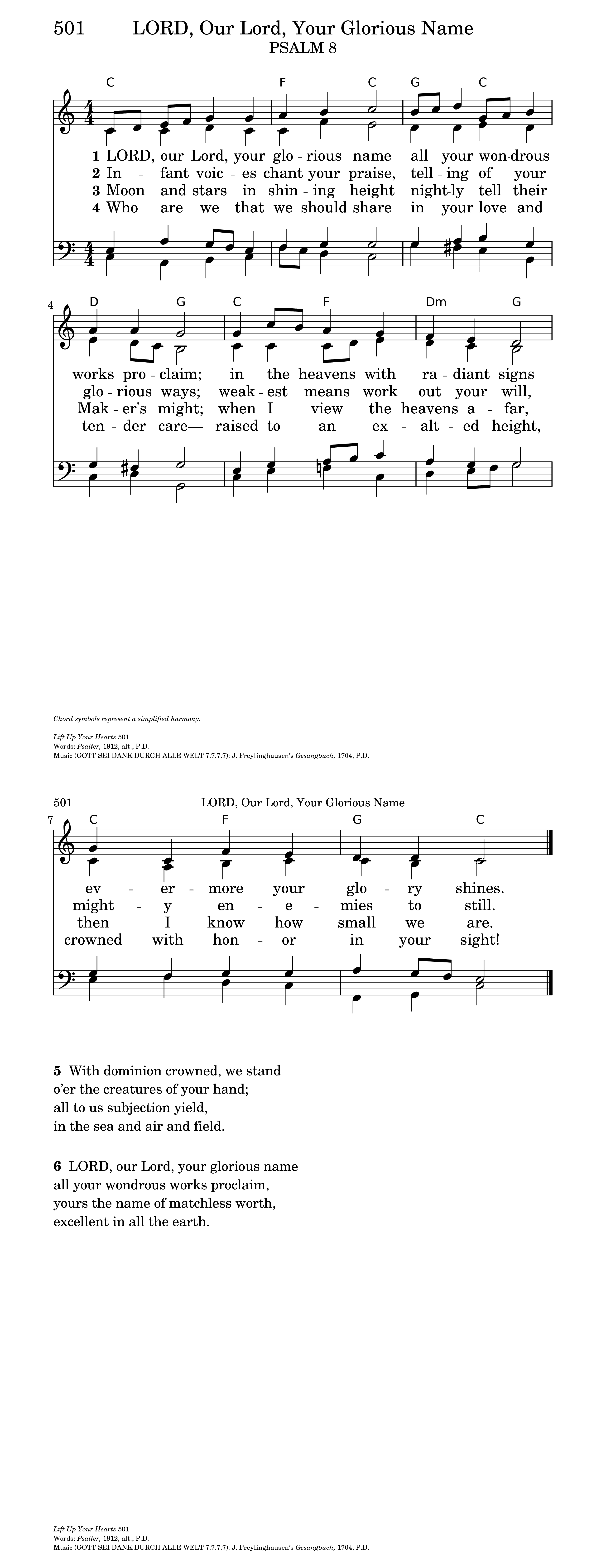1.Lord, our Lord, thy glorious name
all thy wondrous works proclaim;
in the heav'ns with radiant signs
evermore thy glory shines.
How great thy name!
Refrain:
Lord, our Lord, in all the earth,
how great thy name!
Thine the name of matchless worth,
excellent in all the earth;
how great thy name!
2. Infant lips thou dost ordain
wrath and vengeance to restrain;
weakest means fulfill thy will,
mighty enemies to still.
How great thy name! [Refrain]
3. Moon and stars in shining height
nightly tell their maker's might;
when thy wondrous heav'ns I scan,
then I know how weak is man.
How great thy name! [Refrain]
4. What is man that he should be
loved and visited by thee,
raised to an exalted height,
crowned with honor in thy sight!
How great thy name! [Refrain]
5. With dominion crowned he stands
o'er the creatures of thy hands;
all to him subjection yield
in the sea and air and field.
How great thy name! [Refrain]
Scripture; Matthew 21:16; 1 Corinthians 15:27; Ephesians 1:22; Hebrews 2:6-7
The hymn "Lord, Our Lord, Thy Glorious Name" is based on Psalm 8 from the Bible, and it has been used in Christian worship for centuries. However, the hymn itself, as it is known today, was written by Joseph R. S. Smith in 1870.
Joseph R. S. Smith was a hymn writer and composer, and he is credited with writing both the lyrics and the music for this particular hymn. The hymn reflects the awe and majesty of God's name, inspired by the opening verses of Psalm 8, which is attributed to King David.
The hymn's lyrics emphasize God's grandeur as revealed in His creation, and the music was designed to be uplifting, often paired with majestic tunes. While the hymn was written in 1870, its use has continued to spread in Christian worship over the years, particularly in traditional and contemporary church services.
It’s important to note that while the specific hymn "Lord, Our Lord, Thy Glorious Name" was written in the 19th century, it is part of a long tradition of Christian hymns inspired by Psalm 8 and other biblical texts celebrating God's majesty.
The hymn "Lord, Our Lord, Thy Glorious Name" is a Christian song that emphasizes the majesty and glory of God, often reflecting the Psalmist's awe and praise of God's name and greatness. The hymn's text is typically based on Psalm 8, which begins with the verse: "O Lord, our Lord, how majestic is your name in all the earth!" (Psalm 8:1). This psalm is attributed to King David and is a beautiful expression of wonder at God's creation and His sovereignty.
Historical Background:
Psalm 8: The hymn is closely tied to Psalm 8, a psalm of David that reflects on the beauty and grandeur of God's creation. The psalm opens by addressing God directly, calling attention to His majestic name. It also contrasts the majesty of God's name with the apparent insignificance of humans, yet celebrating how God has elevated humanity with purpose and dignity.
Hymn Adaptation: Many hymns are adaptations or paraphrases of biblical passages. "Lord, Our Lord, Thy Glorious Name" is one such adaptation of Psalm 8. It focuses on themes like the grandeur of creation, human dignity, and God's care for His people. It often brings a tone of awe and reverence, with believers acknowledging God's greatness over all the earth and His graciousness toward humankind.
Musical Setting: The hymn may be set to various melodies, but one of the most popular is the tune "Ode to Joy" by Ludwig van Beethoven, from his Ninth Symphony, which is often used in hymns. This majestic and uplifting melody underscores the hymn’s praise of God’s glory.



No comments:
Post a Comment